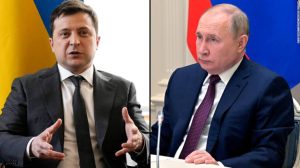
Russia has signaled its readiness to negotiate with Ukraine, but it has made it clear that for talks to take place, recognition of Moscow’s territorial claims over five Ukrainian regions, including Crimea, is “imperative” for resolving the conflict.
Since its military campaign began in February 2022, Russia has seized significant parts of four Ukrainian regions, including Crimea, which it annexed in 2014.
Ukraine has consistently condemned these annexations as an illegal act and stated it will never recognize them.
Meanwhile, European officials have warned that conceding to Moscow’s demands could create a dangerous precedent and provoke future aggression.
“The Russian side has repeatedly confirmed its readiness, as confirmed by the president, to begin negotiations with Ukraine without any preconditions,” Kremlin spokesman Dmitry Peskov said in a statement to state media on Monday.
However, when asked about the possibility of preconditions for negotiations, Russian Foreign Minister Sergei Lavrov stated: “International recognition of Russia’s ownership of Crimea, Sevastopol, the Donetsk People’s Republic, the Lugansk People’s Republic, the Kherson and Zaporizhzhia regions is imperative.”
Lavrov’s comments were made during an interview with Brazilian newspaper ‘O Globo’, which was later published by the Russian Ministry of Foreign Affairs.
Meanwhile, United States President Donald Trump remarked earlier that he believed Ukrainian President Volodymyr Zelensky might be prepared to concede Crimea in a ceasefire deal, as negotiations towards a truce entered what Washington referred to as a “critical” week.
Putin Declares 72-Hour Ceasefire for May
In related developments, Russian President Vladimir Putin has announced a three-day full ceasefire in the ongoing war with Ukraine, planned for May to commemorate the 80th anniversary of the Soviet Union’s victory in World War II.
According to the Kremlin, the 72-hour ceasefire will begin on May 8 and end on May 10, with a call for Ukraine to participate as well. “All hostilities will be suspended during this period,” the Kremlin’s statement read. “Russia believes that the Ukrainian side should follow this example.”
The Kremlin further clarified that if Ukraine violates the ceasefire, Russian forces would respond with an “adequate and effective” measure.
Ukraine, however, responded to Putin’s announcement by calling for an immediate month-long ceasefire.
“If Russia truly wants peace, it must cease fire immediately. Why wait until May 8th? If the fire can be ceased now and since any date for 30 days – so it is real, not just for a parade,” Ukraine’s Foreign Secretary Andrii Sybiha wrote on social media.
Putin also expressed his willingness to engage constructively with international partners to address the “root causes” of the conflict.
For Russia, this term is seen as a reference to some of its more hardline demands, including preventing Ukraine’s NATO membership, restricting the size of Ukraine’s military, and exerting influence over Ukraine’s domestic affairs.
If respected by both sides, the May ceasefire would mark the first full ceasefire since Russia launched its full-scale invasion of Ukraine more than three years ago.
However, the temporary nature of the ceasefire suggests that broader peace talks continue to be elusive.
Russia had previously rejected a US proposal for a full 30-day ceasefire, instead imposing stringent conditions. Ukrainian President Volodymyr Zelensky had stated that Ukraine accepted the offer.
In the past, Kyiv and Moscow had agreed on a partial ceasefire during Easter, though both sides accused each other of violating the truce. Since then, Russia has continued its offensive, leading to widespread casualties across Ukrainian cities.
Given the past failures of ceasefire agreements, Ukraine expressed skepticism regarding Putin’s latest offer, noting that Russia had previously announced a similar truce during Easter, only to massively violate it.
The post Putin Gives Conditions For Ending Russia-Ukraine War appeared first on Naija News.


